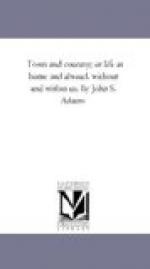The defence here closed. The officer for the prosecution now arose, and with equal faithfulness and ability argued his side of the question. He thought the reasons why Smith had not before informed were full and explicit; and, as to the testimony of the eight as to the past good character of the prisoner, he saw no reason why a man should be always good because for two or more years he had been so. A great temptation was presented; he was young—perhaps at the moment regardless of the result, the penalty of the crime; he did not resist, but yielded; and as to the argument of the learned counsel, that Mr. S. did not see what he testifies to have seen, it is useless to refute such an unfounded allegation. Can you suppose Smith to be benefited by this prosecution further than to see justice have its dues? Settle it then in your minds that Mr. Smith did actually see all he says he did. We come next to the description given by Smith of the man seen. He said he was short in stature, and wearing a fur cap. Look at the prisoner,—is he not short?-and the testimony of two of the previous witnesses distinctly affirm that for the past six weeks he has worn a fur cap. What more evidence do you want to prove his guilt?
The prosecuting officer here closed. We have given but a faint outline of his remarks; they were forcible and to the point.
It was near the dusk of the second day’s trial that the judge arose to charge the jury. He commented rather severely upon the attempt to impeach the character of Smith. His address was not lengthy; and in about thirty minutes the jury retired, while a crowded audience anxiously waited their return. It was not till the rays of the morning sun began to be seen that it was rumored that they had arrived at a decision and would soon enter. All was silent as the tomb. The prisoner, although aware that his life was at stake, sat in great composure, frequently holding converse with his friends who gathered around. How anxiously all eyes were turned towards the door by which they were to enter, wishing, yet dreading, to hear the final secret! The interest of all watched their movements and seemed to read acquittal upon each juror’s face. The prisoner arose, the foreman and he looking each other in the face. The clerk put the question, “Guilty, or not guilty?” The ticking of the clock was distinctly heard. “Guilty!” responded the foreman. A verdict so unexpected by all could not be received in silence, and, as with one voice, the multitude shouted “False! false! False!” With great difficulty were they silenced and restrained from rescuing the prisoner, who, though greatly disappointed, heard the verdict without much agitation. Innocent, he was convinced that justice would finally triumph, though injustice for a moment might seem to have the ascendency.




